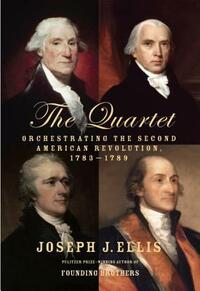Take a photo of a barcode or cover
109 reviews for:
The Quartet: Orchestrating the Second American Revolution, 1783-1789
Joseph J. Ellis
109 reviews for:
The Quartet: Orchestrating the Second American Revolution, 1783-1789
Joseph J. Ellis
Great work on the establishment of the United States and how that required visionaries to think outside state boundaries.
My review is technically a spoiler since the review just consists of a list of my favorite points. The book is short and you may wish to just read it.
•How terrible the situation was under the Articles of Confederation. The army was unpaid and threatened to mutiny, the colonies refused to pay for any debt perceived as national, and the delegates were routinely absent from Congress.
•The nature of George Washington's greatness. "Indeed no successful American general ever lost so many battles. His greatest gift was resilience rather than brilliance...."
•Thomas Jefferson proposed that slavery should end no later than 1800 and the proposal only lost by one vote.
•Madison's greatest insight may have been that the failure to make a strong government with well-defined roles and the various ambiguities in the Constitution are its great strength making later argument and compromise the actual structure of the process (like the Talmud). This also indicates that these founding fathers explicitly rejected what would be called originalism today.
•The difference between the reverence with which the Bill of Rights is held today and the way that Madison threw it together while arguing that it was unnecessary.
and
•Madison's thought that the true danger in loss of liberty for individuals and minorities would come from popular majorities, not the government, and that the Bill of Rights would not prevent these abuses.
Spoiler
A fascinating account. Most interesting to me were:•How terrible the situation was under the Articles of Confederation. The army was unpaid and threatened to mutiny, the colonies refused to pay for any debt perceived as national, and the delegates were routinely absent from Congress.
•The nature of George Washington's greatness. "Indeed no successful American general ever lost so many battles. His greatest gift was resilience rather than brilliance...."
•Thomas Jefferson proposed that slavery should end no later than 1800 and the proposal only lost by one vote.
•Madison's greatest insight may have been that the failure to make a strong government with well-defined roles and the various ambiguities in the Constitution are its great strength making later argument and compromise the actual structure of the process (like the Talmud). This also indicates that these founding fathers explicitly rejected what would be called originalism today.
•The difference between the reverence with which the Bill of Rights is held today and the way that Madison threw it together while arguing that it was unnecessary.
and
•Madison's thought that the true danger in loss of liberty for individuals and minorities would come from popular majorities, not the government, and that the Bill of Rights would not prevent these abuses.
Illuminating look at what happened after the Revolution that turned us from a collection of independent states (Rhode Island, you were very annoying about it) into a nation. Great narrative nonfiction: well written, engaging, not too long and a strong authorial voice.
A very readable account of the work behind the scenes to make the Constitution come to replace the Articles of Confederation. Ellis says without quite saying it that the conniving of his quartet is a coup, a "second revolution". I'm amenable to his argument, but it's a slim volume, so it's a little lacking in support and quotations. I felt that I had to rely on trust more than I'd like. Some of the conclusions I didn't quite find believable, as when he said "Madison's 'original intention' was to make all 'original intentions' infinitely negotiable'." (172) It's certainly true that Madison was leaving questions open (a fallback position) and setting rules for later argument, but I don't think that means he was the world's first postmodern literary critic. I objectively doubt the legitimacy of an interpretation of the Constitution understood as slam poetry, for instance. Most of the few moments of commentary on the present are thankfully relegated to the end notes.
It's aight.
It's aight.
I’ve always been confused about how we “became a nation” and why some people value states’ rights and some value federal power. The Founding Fathers were always depicted in mystical terms —nearly saints who bathed all decisions in prayer. The reality is not that neat. How did we go from a Declaration of Independence to a Constitution with a Bill of Rights tacked on? This book answers those questions.
Democracy and capitalism were not even in the vocabulary of the Founding Fathers. It truly is amazing that what they created is still applicable in a world so different from its inception.
I took a gamble that this book might be interesting, and it surprised me by being more interesting than I hoped. And intriguing. It's left me pondering the many differences (and similarities) between our beginnings and our government today.
Some fascinating insight into the founding of America that is somewhat hampered at times by style.
Eh, this book was just okay. It gets stars because it's about my favorite historical period, but it doesn't really add anything unique or an interesting take. I expected a lot more depth than there was. Still, yay constitution!


